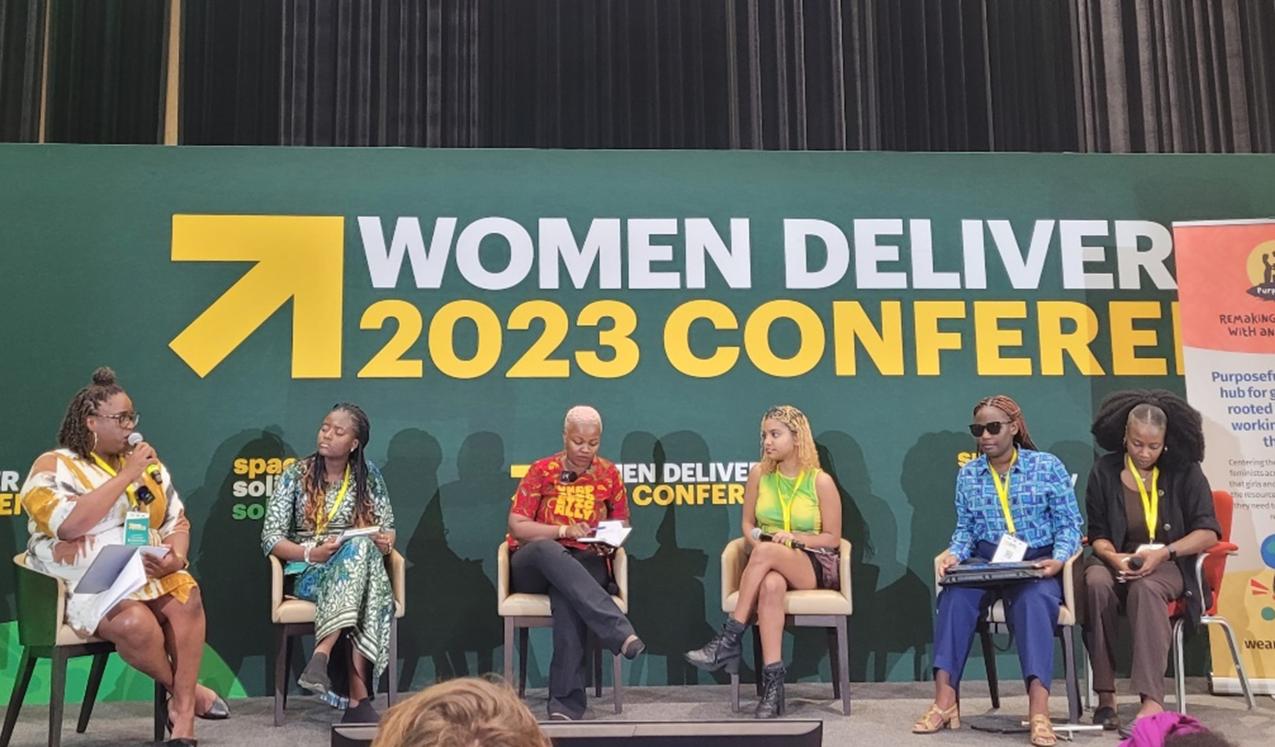
- Blog
- 31 Agosto 2023
'How can I be too young to understand what's happening to me?'
- Author: Natasha Wright
- Published by: ALIGN
An exceptionally vibrant array of youth participants made their presence felt at the 6th Women Deliver Conference in Kigali in July this year. These young people, who joined from organisations and movements all over the world, took their place alongside world-renowned feminists and gender equality advocates to share their perspectives.
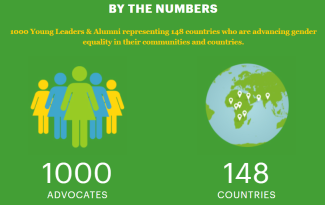

© Women Deliver
I attended as a Youth Delegate as part of the ALIGN team, and was excited to learn how youth voices would be represented. I came away from Women Deliver feeling motivated and inspired to further change the norms that we live with today: those that perpetuate the belief that young people are not qualified to speak and lead discussions on their own lives and experiences.
Let me share some of the inspiring messages from young feminists and youth leaders who had a platform to elevate their work.
‘Youth are not future leaders, they are leaders right now’
A day ahead of the main conference, many young delegates convened for the Youth Deliver conference. This pre-conference was opened by the President of Women Deliver, Maliha Khan, whose bold statement affirmed the feeling of the room, ‘Youth are not future leaders, they are leaders right now’.
It soon became clear from youth-led sessions that existing social norms, which often relegate young people to the margins of discussions about their own experiences, are now being challenged. It may be gradual, but key spaces such as climate change, social media regulation, and sexual and reproductive health rights are already being shaped by young voices. So, we must continue to challenge language claiming that young people are ‘the voices of the future’ and harness alliances with an older generation of feminists to promote youth as the leaders of today.
Three words, in particular, inspired youth delegates in their calls to centre young people in work on gender justice: decolonisation, disruption, dreaming.
Decolonization now!
‘Teach less, listen more.
Girls know, I've worked with girls, I was a girl.
The girls – they really know what they want’.Nyawira Wahito, Assistant Director, Resource Center for Women and Girls
More than anything else, the ongoing conversation around decolonisation emerged as extremely important for youth delegates. While the concept of decolonising aspects of research and interventions, especially for Global North institutions, is more widely understood – youth delegates highlighted a persistent disconnect when involving young people in these discussions.
Several young leaders and participants reported a big gap between the agendas and working practices of funder institutions and how movements are mobilising. Resource holders are still so caught up in ‘ticking boxes’ that the systems cause unnecessary stress for movements and young community leaders, restricting them from bringing about authentic change.
Young people are consistently left out of conversations. And when they are involved, they say it can feel tokenistic: they are often brought in at the end of discussions to rubber stamp strategies that may not have much real-world value. They report deep colonial attitudes, with global institutions thinking they know more than local populations without listening to people in communities. To ensure authentic decolonisation, as Ramatu Bangura of the Children’s Rights Innovation Fund said, we must include youth ‘as comrades and allies, and not beneficiaries’.
Disrupt decision-making spaces
‘How can I be too young to understand what is already happening to me?’
Gary Layn, Content Writer, YLabs
Disruption is key to changing prevailing social norms. To ‘disrupt’ the status quo and move towards positive change, delegates stressed the need to invite and highlight new voices of youth leadership.
Youth leaders already challenge norms and fight for their voices to be heard. But, we need to ask ourselves: ‘what can we do to amplify the voices of young feminists?’
Youth voices are still woefully underrepresented. A recent report on the State of Youth Civil Society from Restless Development highlights the dissatisfaction of youth and the ‘disconnect from the decision-making processes that directly affect their lives’. It goes further, reiterating the importance of investing in youth as a force for change in an era of accelerated backlash and democratic backsliding.
Our conversations around intergenerational partnerships centred heavily on how we can promote more just and equitable collaborations, ensuring young people receive the recognition they deserve. However, many young leaders said they must work around more ‘experienced’ colleagues because their word is more likely to carry weight – highlighting the continued need to fight for a place at the table.
In a rousing speech at the Youth Deliver pre-conference, Jairo Rodrigues said: ‘If they don’t invite you to the table, then build you own table’. And the Conference, in general, demonstrated that a multitude of experienced, passionate young individuals have the skills needed to build their own tables – yet they are still excluded from existing discussions.
There are continuing discourses about 'earning your place' and 'starting from the bottom', and young people are often overlooked even when they have vast knowledge (often self-taught) or lived experience.

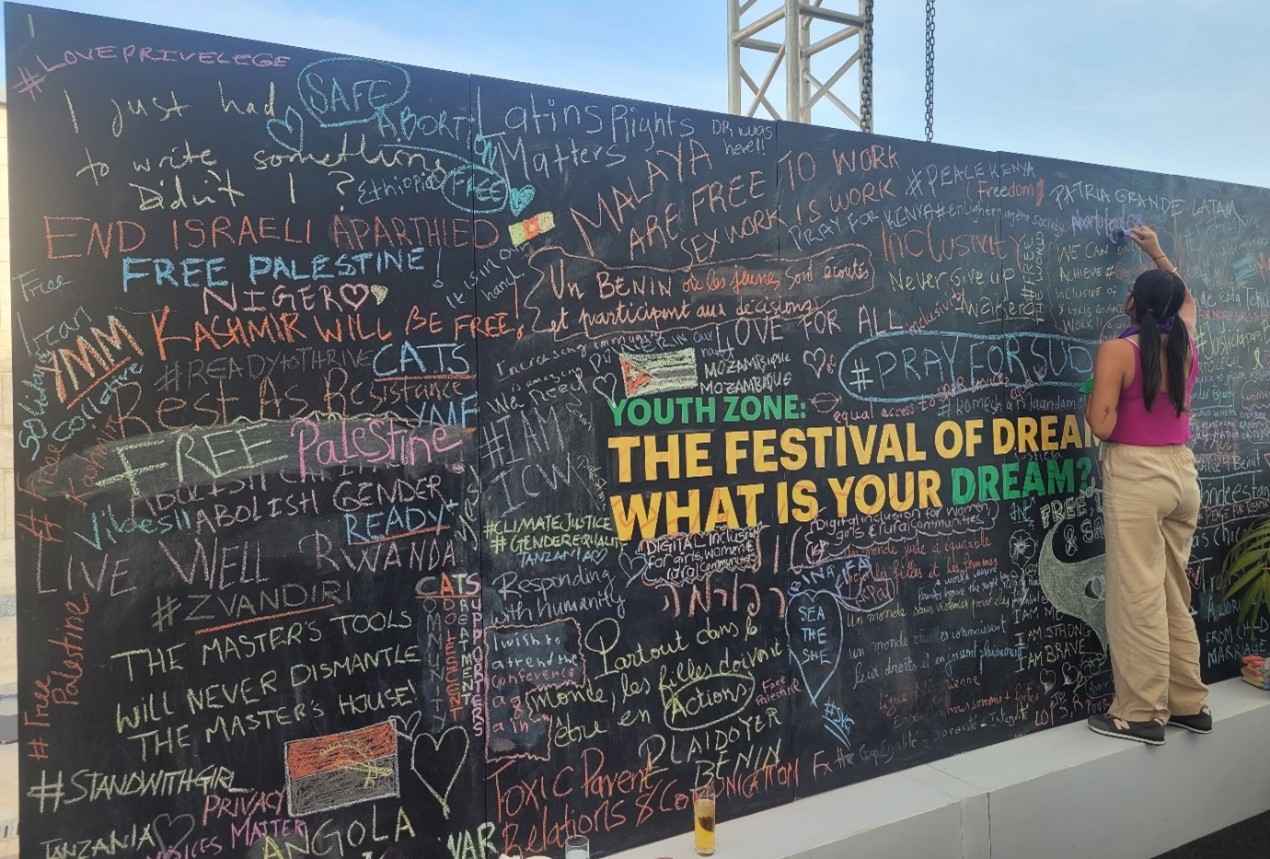
Dreaming of gender justice
‘Believe that young girls can be the protagonist of their own communities.
Allow young people to challenge adults, to be controversial’
Melissa Simplicio, Club Leader and Coalition President of Girl Up
A graffiti wall in the Youth Zone allowed young people to come together and share their dreams for the future. By the end of the conference, this Festival of Dreams was full of visions for #climatejustice, a free Palestine, safe abortions, digital inclusion, and the recognition of sex work as real work.
The phrase ‘The master’s tools will never dismantle the master’s house’ stood out as a reminder that while young people are working hard to dismantle norms and advance their rights, they are still working within a system that sidelines their voices. Real change requires a change in ways of working with youth to amplify their voices in their communities and on a global stage.
Being a true ally for youth-led movements means trusting young leaders to know what they need. Older feminists need to know when to ‘pass the torch’, and to understand that youth do not always need to rely on their external validation.
What next?
The first step is to abandon the narrative of ‘meaningful youth engagement’ and recognise youth as the young leaders that they already are. But I suggest that far more is needed to support youth movements and mobilisation.
- Decolonise governance and centre young people in planning and strategy discussions – not just at implementation or validation stages. This can ensure that communities and movements receive the support they need, and not just what funders and grant partners assume they require.
- Advance digital rights and recognise online mobilisation as valid and effective for feminist movement-building to ensure support and protection for activists working in these spaces.
- Move towards unrestricted and ‘bottom up’ approaches to funding. This will enable movements to mobilise effectively in their communities without bureaucratic restrictions imposed by Global North funders.
Above all, believe in the visions and dreams of young leaders and activists, ally with the grassroots and listen to their voices. This is the most effective tool for meaningful and lasting change.
About the author


Natasha Wright is a Project Management Officer with the Gender Equality and Social Inclusion Team at ODI. Her role includes the financial and administrative management of ALIGN’s existing workstreams, project management of GESI’s wider portfolio and support to business development opportunities. She joined ODI in April 2017 and has worked with the Global Risk and Resilience and Humanitarian Policy Group programmes before joining GESI in October 2018. Natasha has a BA in History and Politics from Queen Mary University of London, and prior to working at ODI, she held a position as a Parliamentary Assistant to a London MP.
- Countries / Regions:
- Global
Related resources
Blog
16 Agosto 2023
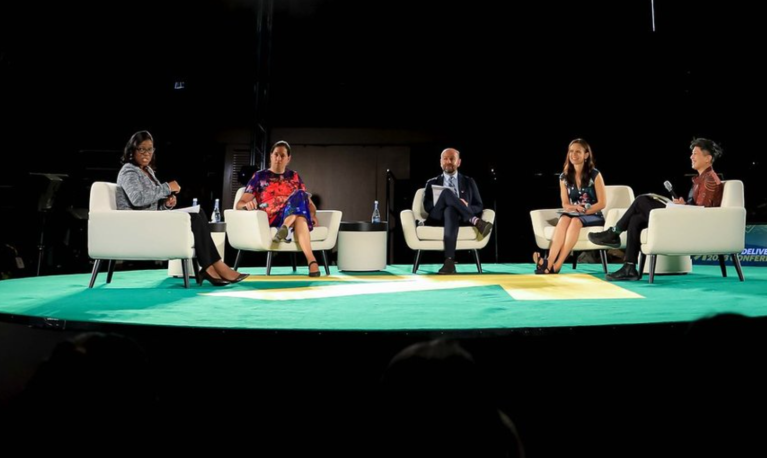
Blog
18 Julio 2023
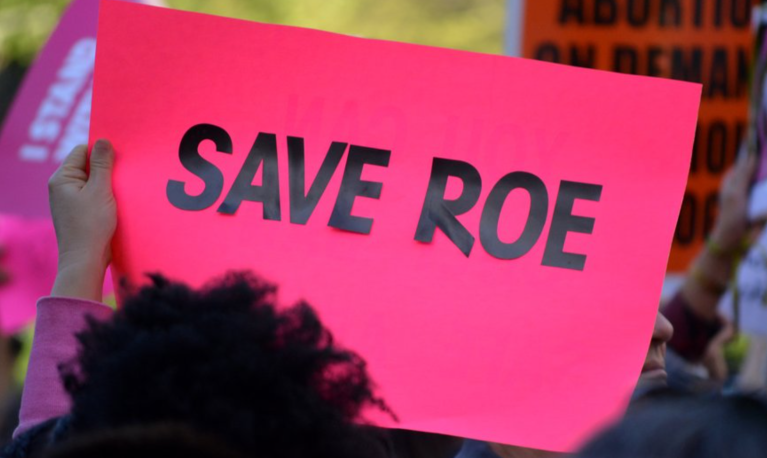
Briefing paper
10 Julio 2023
